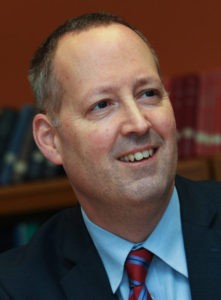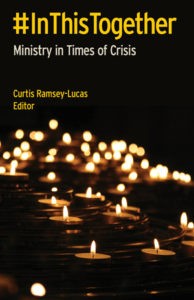The first week of March 2020, I was making final edits and scheduling articles to be published in The Christian Citizen the following week. Several stories focused on Lenten practices, while others recognized the observance of Women’s History Month. I also was making plans to attend the American Association of People with Disabilities annual leadership awards gala in Washington, D.C., where Sen. Robert Dole was to receive an award.
That was before the novel coronavirus in the United States took a deadly turn, when in the span of just over a week, 10 people died of COVID-19 in King County, Wash. On March 4, The Christian Citizen published a first-hand account of the situation in Kirkland, Wash., location of the first fatality from COVID-19 in the United States.

Curtis Ramsey-Lucas
In the weeks and months that followed, we published an extensive series of articles on ministry responses to COVID-19. Our writers stepped up to offer ideas for ensuring ministry continuity as churches shifted to online forms of gathering, tips and practices for clergy self-care, and how to engage in pastoral care in a time of self-isolation and social distancing.
Like many others, I spent the first months of the pandemic juggling working from home with online learning for children whose schools were closed, including my eldest, suddenly home from his final semester of college and facing the prospect of no graduation ceremony and an economy in free fall.
My church, like so many others, moved worship services and prayer and study opportunities online and began to plan for the prospect of an extended period of ministry and pastoral care absent personal proximity.
My employer, American Baptist Home Mission Societies, instructed all staff to work remotely and suspended onsite meetings at its Leadership and Mission Building in King of Prussia, Pa. Like so many others in workplaces and schools, we all soon were connecting and collaborating via Zoom.
In April, I asked Christian Citizen contributors to begin to consider the longer-term implications of the coronavirus crisis not only for the church but also for society — to begin to think of the days we are living through as an apocalypse, not in the popular understanding of that term as the end of history, but in the original Greek meaning of the term as a revelation, unveiling or unfolding of things not previously known and which could not have been known apart from the unveiling. Specifically, I asked, what is this pandemic revealing about inequities and injustices in U.S. society? What is it unveiling about the church? What good and evil is it unfolding? What hope is to be found in these times?
“What is this pandemic revealing about inequities and injustices in U.S. society? What is it unveiling about the church?”
This led to a series of articles about the disproportionate impact of COVID-19 on African Americans in particular, and more generally on poor and vulnerable populations, due to disparities in access to health care and economic opportunity — disparities rooted in systemic racism and structural injustice. Our writers considered particular strengths of Baptist tradition and polity for approaching ministry in these challenging times, how life as we know it has fundamentally changed, and what needs to be different once life begins to return to something resembling “normal.” Looking to the future, our writers warned of a rising tide of mental health concerns and the growing need for communities of faith to provide space for healing as individuals process grief.
As this second round of COVID-19 related articles was being published, George Floyd’s very public death beneath the knee of officer Derek Chauvin in Minneapolis sparked protests throughout the United States and around the world and furthered support for Black Lives Matter and other efforts to address historic, institutionalized racism in society.
Floyd’s death drew attention to further disparities and injustices in the treatment of African Americans, including disproportionate rates of imprisonment, involvement with the criminal justice system and mistreatment and death at the hands of police. Once again, The Christian Citizen pivoted to cover this story, including a first-hand account of the Capitol Hill Occupied Protest in Seattle, why Americans interpret current events in such divergent and divided ways, and what hope can be found amid current division and unrest.
 I have collected some of these stories and more in a new book, #InThisTogether: Ministry in Times of Crisis. Included are expanded versions of articles previously published in The Christian Citizen, as well as new content from ministry practitioners and subject matter experts on ministry in times of crisis. Contributors write from the perspective of Christian faith seeking understanding during the trials and tribulations of early 21st century life in the United States, responding to questions about what we are learning during these crises — about God, our nation, ourselves, neighborliness and the church.
I have collected some of these stories and more in a new book, #InThisTogether: Ministry in Times of Crisis. Included are expanded versions of articles previously published in The Christian Citizen, as well as new content from ministry practitioners and subject matter experts on ministry in times of crisis. Contributors write from the perspective of Christian faith seeking understanding during the trials and tribulations of early 21st century life in the United States, responding to questions about what we are learning during these crises — about God, our nation, ourselves, neighborliness and the church.
The AAPD gala convened as planned, although I did not attend. As in years past, emerging disability rights activists were recognized, and awards were given to corporate and political leaders. Dole received a Lifetime Impact Award. From his first speech as a United States senator in 1969, to his return to the Senate chamber in 2014, to support of the adoption of the U.N. Convention on the Rights of Persons with Disabilities, Dole has championed equal access and opportunity for people with disabilities. He also played a key role in passage of the Americans with Disabilities Act.
“We all face challenges in life — some have a tougher road than others,” Dole wrote in a letter accepting the award. “But what sets us apart is how each one of us chooses to handle those challenges. Our resilience. I’ve faced a few bumps in the road throughout my life, but I’ve always tried to maintain a sense of optimism — looking ahead at brighter days to come.”
Through the bumps in the road, the crises of life, what sets us apart is how we choose to handle those challenges.
“None of us walks the path of life alone.”
Looking ahead, amid this pandemic and the injustices and inequities it has revealed, I appreciate Dole’s words. The road we have traveled thus far has been rough. There will be further bumps along the way. Our resilience — as individuals, communities and as a nation — will continue to be tested. How will we respond? How will we choose to handle the crises we face? Will we struggle to maintain a sense of optimism? Will we remain hopeful or give ourselves over to despair? Will we manage to keep our eyes fixed on brighter days to come?
“None of us walks the path of life alone,” Dole wrote in the closing of his letter. “We help each other along the way.” Truly we are in this together. That fact seldom has been more apparent even as we struggle to reconcile its implications and wrestle with the challenges of moving forward united amid deep-rooted injustice and political and cultural divisions.
Curtis Ramsey-Lucas is editor of The Christian Citizen, a digital-first publication of American Baptist Home Mission Societies. This column is excerpted from #InThisTogether: Ministry in Times of Crisis, published by Judson Press.


